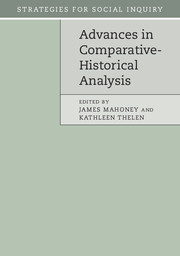Book contents
- Frontmatter
- Contents
- List of figures
- List of tables
- List of contributors
- Preface
- Part I Introduction
- Part II Agenda-setting work
- Part III Tools for temporal analysis
- Part IV Issues of method
- 8 The comparative sequential method
- 9 Nested analysis: toward the integration of comparative-historical analysis with other social science methods
- Epilogue: comparative-historical analysis: past, present, future
- Index
- References
8 - The comparative sequential method
from Part IV - Issues of method
Published online by Cambridge University Press: 05 July 2015
- Frontmatter
- Contents
- List of figures
- List of tables
- List of contributors
- Preface
- Part I Introduction
- Part II Agenda-setting work
- Part III Tools for temporal analysis
- Part IV Issues of method
- 8 The comparative sequential method
- 9 Nested analysis: toward the integration of comparative-historical analysis with other social science methods
- Epilogue: comparative-historical analysis: past, present, future
- Index
- References
Summary
Although comparative-historical analysis (CHA) is often understood to entail the comparison of a small to medium number of cases (usually countries or other macro units), we argue in this chapter that it may be more informative to say that this field involves the systematic comparison of sequences (Rueschemeyer and Stephens 1997). We suggest that a principal overarching methodology of comparative-historical analysis is the comparative sequential method (see Falleti 2010, 20–4). This method is defined by the systematic comparison of two or more historical sequences. In CHA, the “cases” studied nearly always are decomposed into sequences of events, and CHA causal claims rest upon the inferences derived from the analysis and comparison of those sequences. To take a classic example, Barrington Moore's (1966) main cases in Social Origins of Dictatorship and Democracy include countries such as England, France, the United States, and Germany. But these cases are studied as types of sequences of events that unfold over time. These sequences are the central units of comparison, and they provide the main basis for Moore's inferences about the causes of dictatorship and democracy.
The comparative sequential method is an overarching methodology in the sense that it can and must encompass more specific methods of cross-case analysis and within-case analysis. The main cross-case methods include simple matching tools such as J. S. Mill's methods of agreement and difference as well as more complex tools such as statistical analysis and qualitative comparative analysis (QCA). The within-case methods include inductive process tracing and modes of hypothesis testing such as hoop tests and counterfactual analysis. In this chapter, we show how cross-case (in particular, Millian) methods and within-case (specifically, process tracing) are put to use to analyze and compare sequences of events in CHA. We argue that, depending on the kind of sequential argument, contrasting sets of methods are more or less appropriate – and more or less useful – as tools for analyzing sequences and carrying out causal assessment.
- Type
- Chapter
- Information
- Advances in Comparative-Historical Analysis , pp. 211 - 239Publisher: Cambridge University PressPrint publication year: 2015
References
- 69
- Cited by



